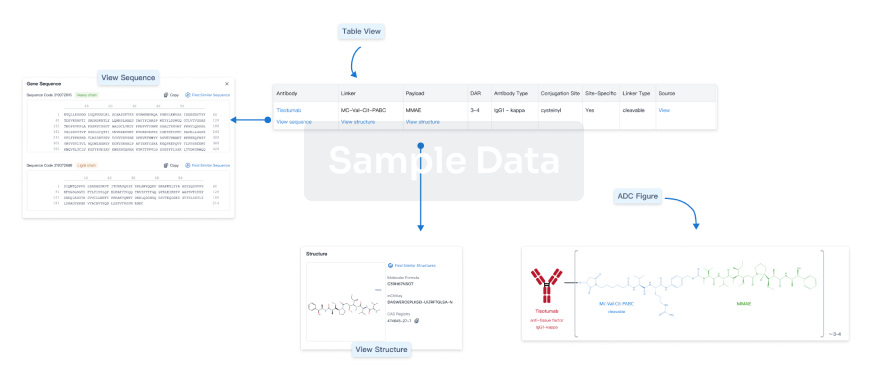Request Demo
Last update 22 Jan 2026
Maridebart Cafraglutide
Last update 22 Jan 2026
Overview
Basic Info
Drug Type Peptide-Antibody Conjugates(PACs) |
Synonyms Anti-GIPR Antibody (Amgen), MariTide, AMG-133 + [1] |
Target |
Action antagonists, agonists |
Mechanism GIPR antagonists(Gastric inhibitory polypeptide receptor antagonists), GLP-1R agonists(Glucagon-like peptide 1 receptor agonists) |
Therapeutic Areas |
Active Indication |
Inactive Indication- |
Originator Organization |
Active Organization |
Inactive Organization |
License Organization- |
Drug Highest PhasePhase 3 |
First Approval Date- |
Regulation- |
Login to view timeline
Structure/Sequence
Boost your research with our ADC technology data.
login
or

Sequence Code 13456153L

Source: *****
Sequence Code 319324125H

Source: *****
Sequence Code 1031376808

Source: *****
R&D Status
10 top R&D records. to view more data
Login
| Indication | Highest Phase | Country/Location | Organization | Date |
|---|---|---|---|---|
| Sleep Apnea, Obstructive | Phase 3 | United States | 25 Nov 2025 | |
| Sleep Apnea, Obstructive | Phase 3 | Australia | 25 Nov 2025 | |
| Sleep Apnea, Obstructive | Phase 3 | Canada | 25 Nov 2025 | |
| Atherosclerosis | Phase 3 | China | 16 Jul 2025 | |
| Atherosclerosis | Phase 3 | Argentina | 16 Jul 2025 | |
| Atherosclerosis | Phase 3 | Germany | 16 Jul 2025 | |
| Atherosclerosis | Phase 3 | Poland | 16 Jul 2025 | |
| Atherosclerosis | Phase 3 | Singapore | 16 Jul 2025 | |
| Intermittent Claudication | Phase 3 | China | 16 Jul 2025 | |
| Intermittent Claudication | Phase 3 | Argentina | 16 Jul 2025 |
Login to view more data
Clinical Result
Clinical Result
Indication
Phase
Evaluation
View All Results
NCT05669599 (Pubmed) Manual | Phase 2 | 592 | Maridebart Cafraglutide 140mg/280mg/420mg | ljyjhmszjc(lppovknhkl) = vdlizkzggn xxpfjvdqbd (kfeykkmqtw ) View more | Positive | 23 Jun 2025 | |
Placebo | ljyjhmszjc(lppovknhkl) = qnzzvhcrsw xxpfjvdqbd (kfeykkmqtw, -4.2 to -0.7) View more | ||||||
Phase 1 | - | 34 | (Japanese Participants: AMG 133 Low Dose) | xgkasfbgdn(ohrhzllqnb) = ucbdsxpnuo tfdnnrkmfe (yfffagdoqk, 57.3) View more | - | 25 Feb 2025 | |
(Japanese Participants: AMG 133 Medium Dose) | xgkasfbgdn(ohrhzllqnb) = jygrjjalhw tfdnnrkmfe (yfffagdoqk, 24.1) View more | ||||||
Phase 2 | 592 | (Without Type 2 Diabetes) | nsbvclymby(ztcnscvajb) = Without Type 2 Diabetes: MariTide Demonstrated up to ~20% Average Weight Loss at 52 Weeks Without a Weight Loss Plateau; With Type 2 Diabetes: MariTide Delivered an Impressive up to ~17% Average Weight Loss at 52 Weeks Without a Weight Loss Plateau wtugijmapn (tchmngoppu ) View more | Positive | 26 Nov 2024 | ||
Placebo (Without Type 2 Diabetes) | |||||||
Phase 1 | 75 | zenatozciu(peiybtzsuw) = tgyyrkctbj wfpjtlpdnd (rxmovjzpdu ) | Positive | 07 Nov 2022 | |||
Placebo | zenatozciu(peiybtzsuw) = zphsdheldo wfpjtlpdnd (rxmovjzpdu ) |
Login to view more data
Translational Medicine
Boost your research with our translational medicine data.
login
or

Deal
Boost your decision using our deal data.
login
or

Core Patent
Boost your research with our Core Patent data.
login
or

Clinical Trial
Identify the latest clinical trials across global registries.
login
or

Approval
Accelerate your research with the latest regulatory approval information.
login
or

Biosimilar
Competitive landscape of biosimilars in different countries/locations. Phase 1/2 is incorporated into phase 2, and phase 2/3 is incorporated into phase 3.
login
or

Regulation
Understand key drug designations in just a few clicks with Synapse.
login
or

AI Agents Built for Biopharma Breakthroughs
Accelerate discovery. Empower decisions. Transform outcomes.
Get started for free today!
Accelerate Strategic R&D decision making with Synapse, PatSnap’s AI-powered Connected Innovation Intelligence Platform Built for Life Sciences Professionals.
Start your data trial now!
Synapse data is also accessible to external entities via APIs or data packages. Empower better decisions with the latest in pharmaceutical intelligence.
Bio
Bio Sequences Search & Analysis
Sign up for free
Chemical
Chemical Structures Search & Analysis
Sign up for free


